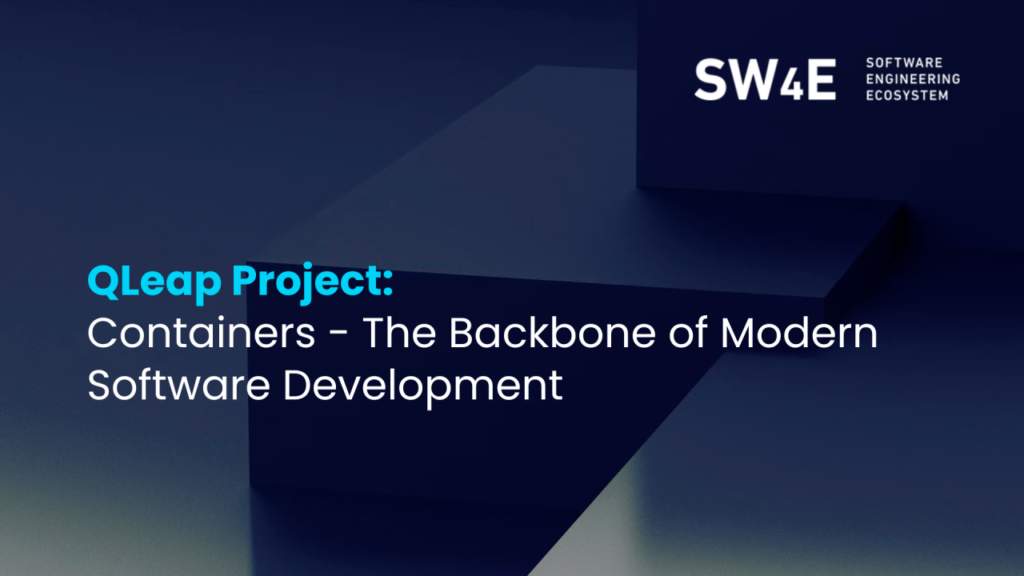February 7, 2025
The QLeap project (2022-2024), funded by Business Finland and industry partners, explored how containers – small, flexible units of software that package applications and their dependencies – are changing modern software development.
Project consortium included Bittium, M-Files, Solita, Vaadin and University of Jyväskylä. The project was supported by Veturi companies Nokia and Tietoevry, and DIMECC-led SW4E ecosystem. The motivation for the project stemmed from the growing adoption of microservices and continuous deployment, with containers increasingly replacing monolithic architectures (where all code runs as one big block) and Virtual Machines (VMs) to improve scalability, modularity, and resource efficiency.
While containers are widely used in cloud computing, QLeap focused on solving challenges beyond traditional cloud environments. As Professor Tommi Mikkonen (University of Jyväskylä) explains:
“We sought best practices and practical challenges in container technology usage outside pure cloud environments. These include regulated development, containerization of AI, and containers in IoT environments.”

Multiple research themes
The study was structured around multiple research themes, including container orchestration, security, multi-cloud deployment, and governance. It included a systematic mapping of academic literature, industrial case studies, and practical demonstrations. The University of Jyväskylä developed a practical demonstration of a High-Availability (HA) cluster to test container security and orchestration in a real-world setup. This collaboration between companies, academia, and the SW4E ecosystem played a crucial role in the project’s success. As Mikkonen highlights:
“Participating companies gained fast-track access to the latest research findings, while the research institution gained insight into real-world industry problems and the opportunity to collect empirical data on company operations.”
Key findings
Key findings confirmed that containers improve deployment flexibility, efficiency, and automation, especially in cloud-native environments. However, security risks, legacy system migrations, and AI integration challenges remain under-researched.
Managing large numbers of containers can be tricky, especially when scaling software to handle more users. Tools like Kubernetes help automate this process by handling things like launching containers, ensuring they run smoothly, and balancing the load across different servers. However, the project found that while Kubernetes is powerful, it also brings challenges in security and monitoring.
Additionally, well-structured collaboration models are crucial for managing distributed systems, particularly in software innovation communities like SW4E and open-source projects like Vaadin. Containers are becoming fundamental in software development, as Mikkonen describes:
“Containers are the new software modules, and they are gradually becoming necessary in almost every software system. Mastering them is essential in modern software development.”
The role of security
The study concluded that containerization is now a standard industry practice, particularly in cloud-native applications, but significant challenges remain in security, compliance, and regulated environments. Participating companies reported successful implementations of containerized workflows, with Bittium focusing on security and DevOps automation, M-Files developing a cloud strategy based on Kubernetes, Nokia advancing edge computing, and Solita optimizing security and cost efficiency. However, Vaadin’s exploration of micro-frontend architectures was impacted by evolving industry trends, particularly the shift away from microservices as a universal solution. Mikkonen emphasizes that security was a particularly important finding:
“It is difficult to pinpoint one single most significant result, but if I had to highlight something, it would be the role of security in containers and container-based development. The project facilitated long-term collaboration between companies and research institutions in this area.”
Future research should address security best practices, optimized container deployment for resource-constrained environments, and the integration of generative AI in containerized systems. Expanding regulatory compliance frameworks for container adoption is also necessary. A follow-up project is already in the pipeline, as Mikkonen confirms:
“A continuation project, involving several of the same participants, is currently under review by Business Finland.”
The QLeap project has laid the foundation for future advancements, providing both academic and industrial insights that will shape the next generation of container technologies.
For more information about the project, have a look at the full final report here: https://arxiv.org/abs/2501.07204
